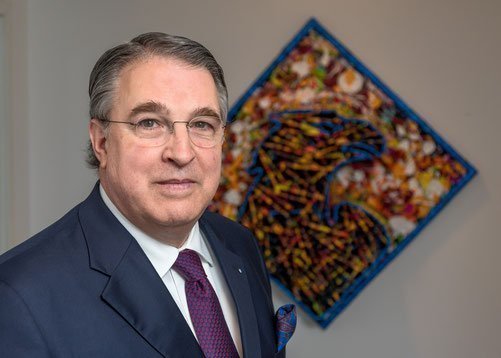Dr. Robin Kiera: In your opinion, what would you call, “one of humanities greatest inventions?”
Dr. Stefan Knoll: All of mankind’s greatest inventions had specialization on the supplier side and individualization on the user side. For example, if you chose the iPhone or the iPad as one of humanities greatest inventions, these two Apple products were both, specializations on the manufacturer side an individualizations on the user side.If we stick with the iPhone example, we can see the process more clearly. Apple, has continuously optimised and renewed its iPhone technology. The user experiences a de facto collective individualization of their needs. What does that mean? It means that after more than a billion iPhones have been sold, any individual character has effectively been minimized. However users still feel they are in an individualized smartphone world. They can put together their own music lists, download apps according to their individual needs and preferences, and express themselves in their own social spaces across a range of social media channels. The very ubiquity of both iPhones and iPads, as well as their impact on our own human behavior and, ultimately, on our society, in my view, make the iPad and iPhone, “among the greatest of humanities inventions.”
Dr. Robin Kiera: How have customer expectations and behaviors changed over the last few years, and what role does digitalization play and how do you understand them?
Dr. Stefan Knoll: We have very thoroughly considered the subject of digitalization and have arrived at two fundamental findings:
1. From the company’s perspective, it is about simplifying processes.
2. From the customer’s perspective, it is about increasing convenience.
From our perspective, both the simplification of processes and the increase in convenience always begin with how we implement the insurance product. So the digitalization of insurance companies digitalization is therefore always a product issue. For us, digitalization means that we want to make everything more simple on the process side and more sensible from the customer perspective. Or, to be more true to our company maxim: Simple. Sensible.
Dr. Robin Kiera: What big changes do you see coming to the industry? For example, Artificial Intelligence, Big Data or Blockchain?
Dr. Stefan Knoll: Your question addresses a point that really annoys me. In every discussion and every lecture on this topic, keywords like “AI”, “machine learning”, “micro services”, “blockchain”, “big data” and many, many more are constantly used. And those who expect answers about what these mean, and what impact they will have on our work and private life are regularly disappointed.
The fact is a culture of misunderstanding has arisen where just a few actually know what all these buzz words mean, but everyone thinks they know enough to comment and be involved. This means inaccurate information is supplemented by even more inaccuracy. Again, in the end digitalization is and remains a product theme. Once the industry has understood that, it may actually start to change.
Dr. Robin Kiera: Studies show that people associate the insurance industry with many things, but simple, easy-to-understand products isn’t one of them. How is that possible?
Dr. Stefan Knoll: Unfortunately, that doesn’t surprise me at all. The insurance industry has not yet fully understood that digitalization starts first and foremost with the product. After all, how should digitalization work if the customer doesn’t understand the products or only with the greatest difficulty.
A product that the customer doesn’t understand has no chance of being completed online or digitally processed. That’s why we have reduced 106 different products down to 16. Our simple16x matrix products: Just enter your age and get 16 prices for 16 insurance policies. All you have to do is choose. We are unique in the world by having this much simplicity. The result is that we only need one simple process, a product information sheet and a policy that covers all product families. An added bonus is that we’ve streamlined the health questions and simplified the entire application process.
Dr. Robin Kiera: What are the consequences of this paradigm change in your company, for your employees and those you want to hire in the future?
Dr. Stefan Knoll: First of all, I want emphasise that I am extremely proud of all of my employees. It is because of them and with their commitment and cooperation, that has enabled me to make Deutsche Familienversicherung as successful as it is today. And the fact is that we look after some 500,000 customers and manage their insurance needs with around 100 employees. This is a joint effort that is unique within the industry. Our maxim is “Simple. Sensible.” and every time my employees present something to me, I ask, “Is this simple? Is it sensible? So, looking into the future, we need people who understand that we only do things that are simple, sensible, and that we’re willing to work independently. Everything else simply doesn’t fit with our flat hierarchies and fast, agile decision-making.
Dr. Robin Kiera: Market rumours indicate you are able to develop completely new insurance products within mere weeks because you’ve built your own innovative inventory management system. How can you react so fast?
Dr. Stefan Knoll: The fact is we probably do have the most advanced inventory management system on the market. The recording and processing of an application is completely automatic and happens in real time. This works because we use an event-based inventory management system that doesn’t rely on traditional, industry-standard batch processing.It’s a system that allows us to launch new products in record time and to map all customer requests and contract changes in real time.The system itself is essentially controlled by the product model editor. All our insurance products cover more than 1,500 input options so that the entire user interface, correspondence and policies handling is controlled centrally. This means product changes are possible almost immediately and new product innovations within a matter of days.
Dr. Robin Kiera: Amazon appears to be interested in the insurance market. With its massive marketing clout, knowledge of consumers and a very well stocked war chest. Does that worry you at all?
Dr. Stefan Knoll: No, not really. We were the first German insurance company with its own Alexa skill and when we started we also wanted to sell insurance contracts via Alexa. But Amazon had not been able to connect Alexa and AmazonPay until a month ago. I think they announced it during the Money2020 event. We already have preparatory talks with Amazon in Germany. So we are very delighted to start selling insurance via Alexa in the next weeks!
Dr. Robin Kiera: Legislators are currently working on new regulations for the industry. What is your experience here?
Dr. Stefan Knoll: Frankly, I find the growing regulatory requirements increasingly frustrating. For example, the implementation of IDD, costs not only my company companies considerable capacity, which from my point of view would be better invested in digital sustainability. This would also be a benefit to business in both Germany and Europe. Instead, we’re having to focus on the standardization of customer information sheets throughout Europe.
What is your vision for the industry and what role do you expect Deutsche Familienversicherung to play in it?
By the end of 2019, we will have generated more new business than Allianz.








